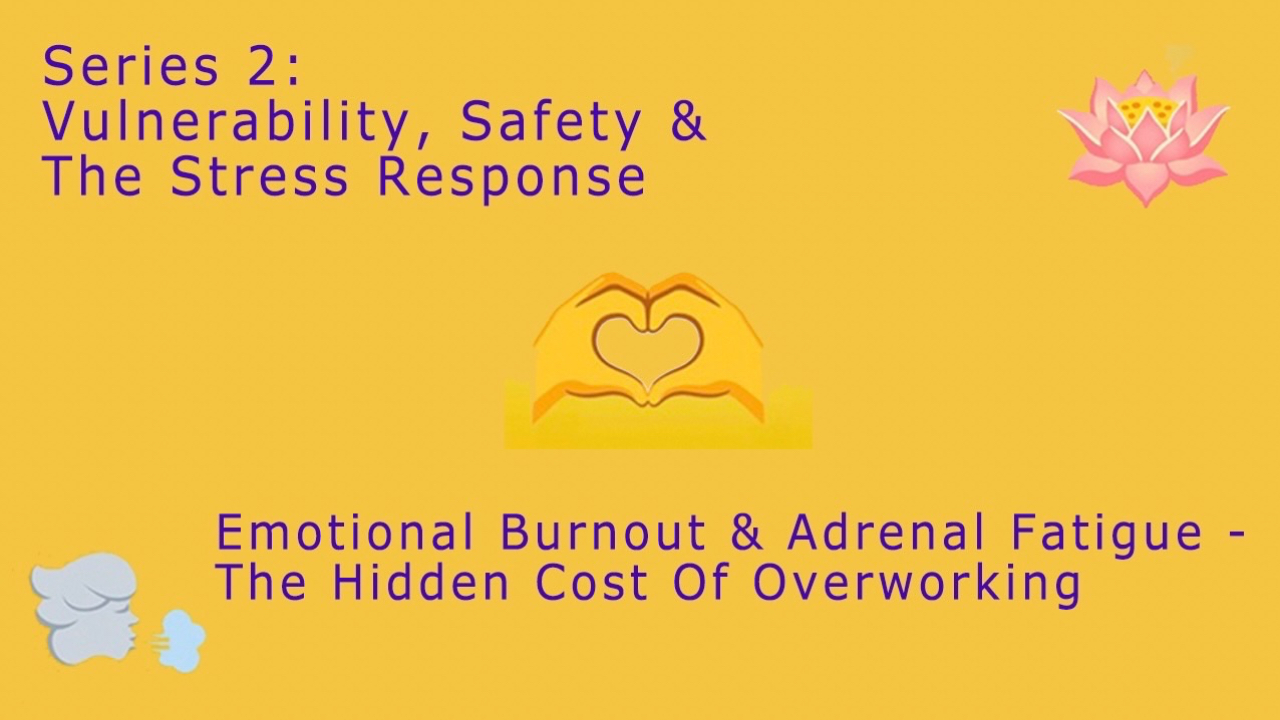Emotional Burnout & Adrenal Fatigue – The Hidden Costs of Overworking.
May 05, 2025
You wake up already exhausted. The to-do list feels endless, and even though you’re running on caffeine and willpower, it’s never enough. Rest doesn’t seem to help, and the idea of “pushing through” is just making things worse.
If this sounds familiar, you might be dealing with emotional burnout and adrenal fatigue—two silent but powerful consequences of chronic stress.
For professional women, the pressure to stay productive, meet expectations, and handle it all can lead to a complete energy collapse. But understanding why burnout happens and how to reverse it is the key to regaining your resilience, clarity, and motivation.
What is Emotional Burnout?
Burnout isn’t just feeling tired—it’s complete emotional, mental, and physical depletion. It happens when chronic stress keeps your nervous system in survival mode for too long.
🚨 Signs of Emotional Burnout:
❌ Feeling emotionally drained and detached
❌ Increased irritability or impatience
❌ Lack of motivation, even for things you used to enjoy
❌ Brain fog, forgetfulness, and decision fatigue
❌ Trouble sleeping, yet always feeling exhausted
Why It Happens:
• Constant pressure without enough recovery time
• Emotional suppression and internalized stress
• High cortisol levels depleting the body’s energy reserves
• Lack of boundaries in work and personal life
Left unchecked, burnout can trigger adrenal fatigue, which takes the exhaustion to a whole new level.
Adrenal Fatigue: When Stress Wears Out Your Energy System
Your adrenal glands produce cortisol and adrenaline, which help you manage stress and stay alert. But when stress never stops, your adrenals become overworked and depleted.
🚨 Signs of Adrenal Fatigue:
❌ Waking up exhausted, even after 8+ hours of sleep
❌ Craving sugar, salt, or caffeine just to function
❌ Feeling “wired but tired” at night—can’t sleep, but can’t relax either
❌ Constant body aches, tension, and unexplained fatigue
❌ Struggling with emotional regulation—small stressors feel overwhelming
When your adrenal system is depleted, even small tasks feel impossible. Your body is trying to conserve energy because it has nothing left to give.
The Burnout Cycle – Why It’s Hard to Break
Burnout and adrenal fatigue don’t just happen overnight—they develop through a repeated cycle of stress, depletion, and emotional suppression.
🔄 Step 1: High stress → Increased cortisol → Pushing through exhaustion
🔄 Step 2: Adrenal overload → Nervous system stays in fight-or-flight mode
🔄 Step 3: Energy crashes → Emotional detachment and mental fog
🔄 Step 4: Continued pressure → Body forces shutdown → Burnout & adrenal fatigue
🚨 The biggest myth about burnout? That more “rest” will fix it. Burnout recovery isn’t just about sleeping more—it’s about rebalancing your entire stress response system.
How to Recover from Burnout & Adrenal Fatigue
The goal isn’t just to rest—it’s to teach your nervous system how to recover effectively. Here’s how:
1️⃣ Give Yourself Permission to Pause
Burnout happens when we override our body’s signals for too long. The first step to recovery is acknowledging that stopping is necessary.
🚀 Try This:
• Schedule one “no-work” evening per week
• Take intentional breaks—even 5 minutes of deep breathing can signal safety to your body
• Reduce multitasking—focus on one thing at a time to decrease cognitive overload
2️⃣ Support Your Adrenal System Naturally
Burnout recovery requires replenishing what stress has depleted.
🚀 Try This:
✅ Prioritize protein & healthy fats to stabilize blood sugar (low blood sugar triggers stress responses)
✅ Drink water before caffeine—dehydration increases fatigue
✅ Increase magnesium intake (found in leafy greens, nuts, dark chocolate) to support adrenal recovery
Your body can’t heal if it’s running on stress hormones alone. Fueling it properly is a key step toward resilience.
3️⃣ Create a “Slow Down” Ritual Before Bed
Burnout often leads to wired but tired syndrome, where you feel exhausted but can’t relax enough to sleep.
🚀 Try This:
✅ Turn off screens 30 minutes before bed (blue light disrupts cortisol levels)
✅ Do 3 rounds of deep belly breathing to activate the relaxation response
✅ Use grounding techniques—press your feet into the floor and remind yourself: “It’s safe to slow down.”
These small shifts help your nervous system transition from high alert to deep recovery mode.
4️⃣ Set Boundaries & Reframe Productivity
🚨 Burnout happens when the desire to be productive overrides the need to be well.
🚨 Rest is not laziness—it’s part of long-term success.
🚀 Try This:
✅ Say no to unnecessary tasks that drain your energy
✅ Redefine success—celebrate progress, not just productivity
✅ Check in with yourself daily: “What do I need today to feel balanced?”
Boundaries aren’t about letting people down—they’re about showing up as your best self.
Your Energy is Worth Protecting
If you’ve been operating in survival mode for too long, it’s time to break the cycle. Burnout isn’t a sign of weakness—it’s a sign that your body is asking for change.
Each time you choose to:
✅ Prioritize rest before you hit exhaustion
✅ Support your body with proper nourishment & stress recovery tools
✅ Set boundaries that protect your energy
…you’re training your nervous system to recover, reset, and rebuild resilience.
💡 Next Up in This Series: Rewiring Safety in the Body – Simple Ways to Shift Out of Stress Mode.






